With technological advances quickly surpassing traditional paper-based practices, it’s easy to see why hospitals and clinics are moving towards cloud-based electronic health records (EHR).
As any busy medical professional will tell you, time is of the essence, especially during a patient visit. With cloud-based EHR, healthcare professionals can spend less time on administrative tasks and more time with patients.
A cloud-based EHR system allows medical professionals to record patient data easily, reducing time spent finding an essential piece of information or charting progress by hand. Combined with an online service for faxing medical records, cloud-based EHR can help streamline and secure patient records without the hassle.
Here are five cloud-based EHRs that you can compare online.
What is a cloud-based EHR system?
A cloud-based EHR (electronic health record) system is a type of healthcare software that stores and manages patient medical records and other health-related information electronically. It is hosted on remote servers and accessed over the internet, rather than being installed and run on local computers or servers.
Best Cloud-based EHR Systems
1. Practice Fusion
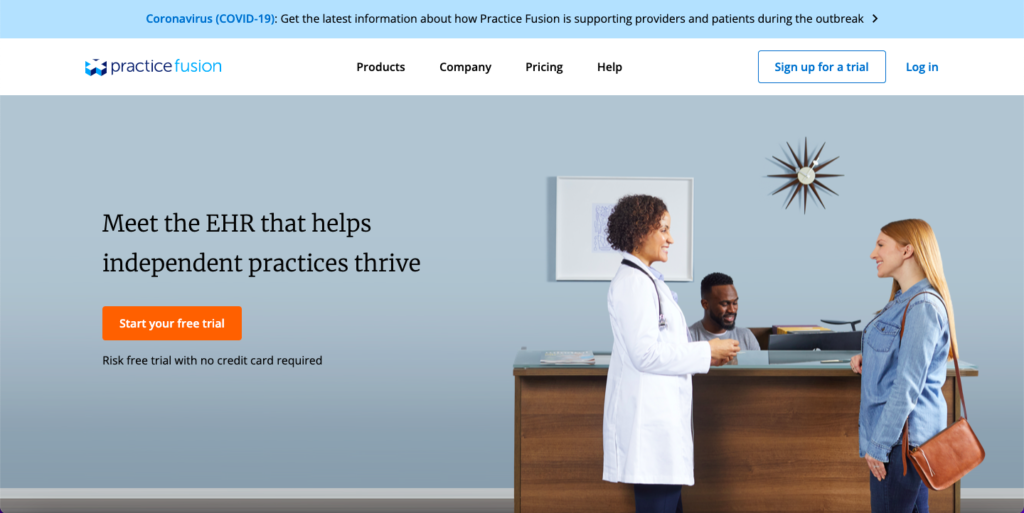
Practice Fusion is a popular EHR solution among medical practitioners. The system provides several features to make note-taking easier, including generating templates based on each patient’s needs.
Physicians may snap photographs of their patients during examinations and capture lab results with just a few clicks. This platform boasts of specialty HIPAA-compliant communication tools for sending secure communications to patients about upcoming appointments or treatment plan modifications.
A key feature of this cloud-based EHR system is how easy it is to customize, including HIPAA-compliant forms with links to video tutorials and advanced options for capturing information. Personalized patient portals allow doctors to use whatever language a patient understands best.
Time-saving defaults include automatic checking of required fields before document submission.
2. DrChrono
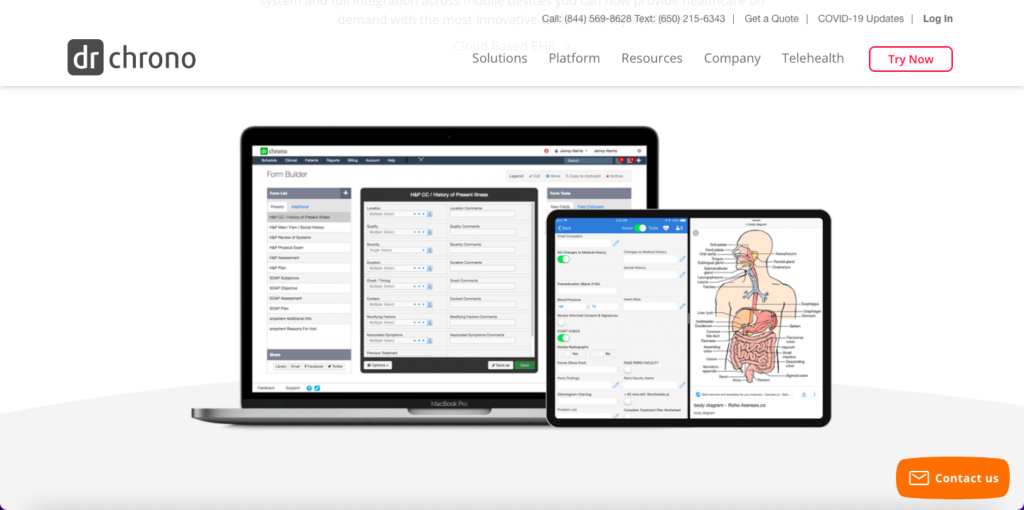
Another cloud-based EHR system, DrChrono is a simple and easy-to-use solution for busy healthcare professionals. The intuitive interface makes charting quick and effortless. All you need to do is drag and drop notes from one of the premade templates into patient charts. Documents can be scanned directly into digital patient files, reducing the need for storing paperwork in filing cabinets.
Multiple language support allows for comprehensive documentation in various languages, making it convenient when working with patients from different backgrounds. Patient privacy is guaranteed via HIPAA compliance audits that ensure systems are safe from potential security breaches or data leaks.
DrChrono’s excellent service doesn’t end with the sign-up process. A full suite of training courses ensures that all employees understand how to make the most of software. This allows administrative staff to effectively communicate important information to medical professionals without needless delay.
With an entire staff on board, there’s no waiting around for someone to figure out how everything works. You’ll be up and running in minutes.
3. Kareo Clinical
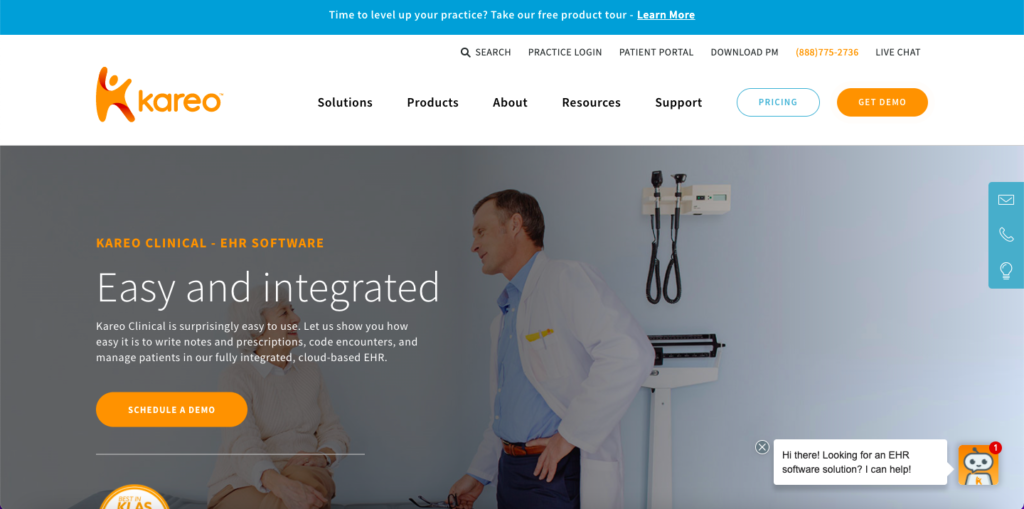
Kareo Clinical is designed with physicians in mind, focusing on ease of use and interoperability. The platform allows users to access services through standard web browsers for compatibility across mobile devices, tablets, and PCs. This means you can always have your patient information on hand, including past visits, test results, hospital records, and insurance details.
With Kareo Clinical software, creating forms is simple. Custom forms can be created directly within the application without the need for third-party tools or design experts. Simply choose from premade templates that are fully customizable. Or you can start from scratch using intuitive point-and-click tools to create patient forms rapidly.
This cloud-based EHR system makes it easy to share medical information with patients. You can send messages directly to their email or post them on portals within your account to ensure your patients are up-to-date on important details related to their care.
4. NueMD
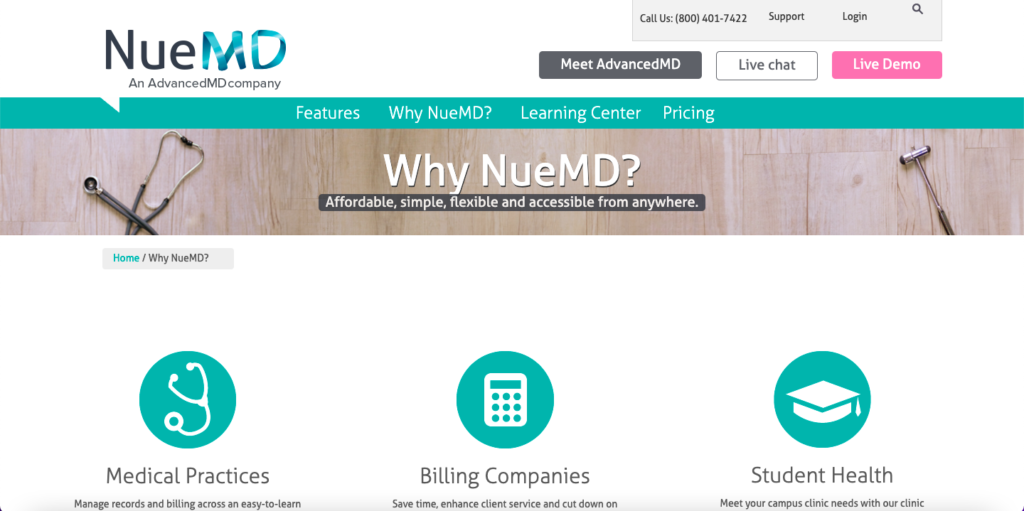
NueMD is a fully-functional platform designed to streamline the documentation process. Whether you work in family medicine, pediatrics, or another specialty, this software provides a seamless way of tracking patient information, from contact information and visit details to medications and allergies.
You can access patient records from anywhere using a secure web portal. It provides access to patient health history, including lab reports and billing records. This ensures continuity of care when multiple providers in different offices or clinics oversee patients.
In addition to making it easy to keep track of your existing patients, NueMD makes it simple to add new ones to your practice. Create customized intake forms for new patients based on individual needs with just a few clicks. These detailed forms can be used offline and online to ensure paperwork is completed efficiently.
5. CareCloud
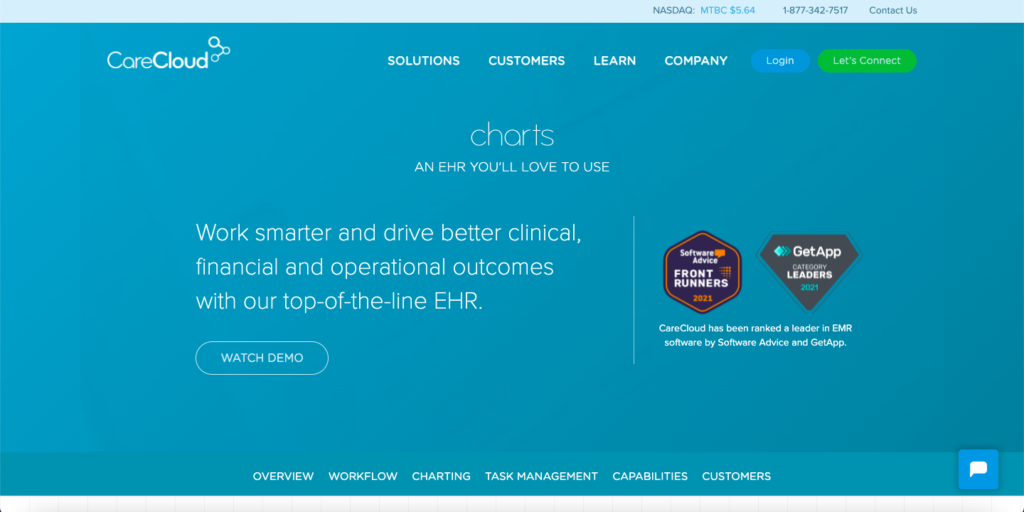
CareCloud is a functional and user-friendly EHR system for medical professionals. This platform has customizable options to help streamline workflow, including a dynamic template function that lets you create documents once and use them for other patients. You can share patient information with patients without worrying about data privacy or security.
CareCloud allows you to accept online payments from anywhere at any time. This added convenience helps improve cash flow for smaller clinics and private practices. Other features include HIPAA compliance, end-to-end encryption, and automatic backups.
This platform also has advanced data importing capabilities, which will enable you to upload structured data to save more time. It’s also equipped with HIPAA compliance tools like audit trails to provide proof of access and updates to patient information.
Final Thoughts on Cloud-Based EHR
Managing healthcare information can be a challenge for medical professionals, hospital staff, and insurance providers. Storing, organizing, accessing, and transmitting patient records can eat up a lot of time if done without the use of technology.
Not only that, but privacy concerns and security breaches are also of vital importance for healthcare institutions. Patients need the assurance that their confidential medical records remain private. At the same time, these patients must have a way to access their information quickly in case of an emergency.
Fortunately, there’s now an easy way to get electronic health records using a mobile phone or tablet. Thanks to cloud-based EHR, patients and physicians alike no longer have to deal with cumbersome paperwork.
If you are a busy medical professional who would like to save time, check out the cloud-based EHR options discussed in this blog post. With the right cloud-based EHR system for your practice, you can manage patient information, track compliance checks, and adhere to regulatory requirements.
Lastly, if you think you need a HIPAA-compliant way to send and receive medical records, consider iFax. It’s an online fax service that you can access on any web browser. It’s also equipped with cross-platform features, allowing you to download and access faxed documents on your mobile device and computers.







